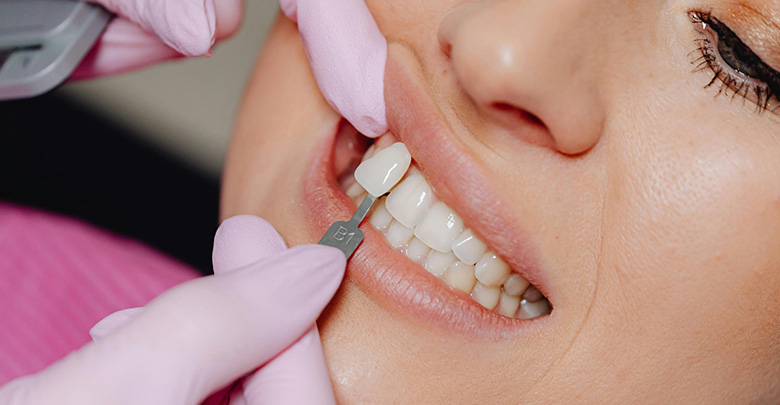When people consider dental veneers—especially E-Max veneers—one of their biggest concerns is whether teeth can rot underneath them. This question is common, and understandably so, because veneers are a long-term cosmetic investment. Many patients looking into smile makeovers or E-Max Veneers in Islamabad want reassurance that their natural teeth will remain healthy once covered.

What Are the Chances of Teeth Rotting Under Veneers?
Teeth do not naturally rot under veneers—unless there is poor oral hygiene, improper veneer placement, or untreated pre-existing dental issues. Veneers only cover the front surface of the teeth; the back and sides remain exposed to food, bacteria, and plaque. When veneers are tightly bonded and the margins are sealed properly, the risk of decay is extremely low. Problems arise only when gaps, chips, or poor hygiene let bacteria sneak in.
How Can You Tell If a Tooth Under a Veneer Is Decaying?
Early detection is key. Watch for:
-
Sensitivity to hot or cold
-
Mild pain or throbbing
-
Discoloration appearing at the veneer edges
-
Bad breath that does not improve
-
Tiny dark spots near margins
-
Veneer loosening
If you notice any of these signs, visit your dentist immediately before the damage spreads.
Can Poor Veneer Placement Increase the Risk of Decay?
Absolutely. Poorly bonded veneers are one of the top reasons decay happens. Common placement issues include:
-
Gaps between veneer and tooth
-
Overhanging edges that trap food
-
Weak bonding
-
Failure to treat cavities before applying veneers
Always choose an experienced cosmetic dentist with a strong portfolio, especially when getting advanced options like E-Max veneers.
Do E-Max Veneers Offer Better Protection Against Decay?
Yes—E-Max veneers are known for their:
-
Superior strength
-
Better bonding
-
Precision fit
-
Minimal tooth reduction
-
Longer lifespan
Their better sealing ability reduces the chances of bacteria entering, making them one of the safest veneer options.
Comparison Table: Do All Veneers Offer Equal Protection Against Decay?
| Feature / Factor | E-Max Veneers | Conventional Veneers |
|---|---|---|
| Strength | Very high | Moderate |
| Tooth Preparation | Minimal | Moderate to high |
| Seal Quality | Excellent | Varies |
| Lifespan | 10–20 years | 5–10 years |
| Decay Risk (with good hygiene) | Very low | Low to moderate |
| Aesthetic Quality | Highly natural | Natural but less translucent |
Results You Can Expect With Well-Placed E-Max Veneers
Patients who choose E-Max veneers and maintain proper oral hygiene usually experience:
Long-lasting tooth protection
Because the veneers bond tightly, they shield enamel from exposure.
Reduced risk of cavities
Most patients report fewer dental issues after switching to high-quality veneers.
Stronger, healthier-looking smiles
E-Max veneers reflect light naturally, making the smile appear brighter and more fresh.
Confidence boost
Knowing your teeth are both protected and aesthetically enhanced makes the investment worthwhile.
Stability for 10–20 years
With excellent care, the underlying teeth remain healthy for decades.
Comparison Table: Do All Veneers Offer Equal Protection Against Decay?
| Feature / Factor | E-Max Veneers | Conventional Veneers |
|---|---|---|
| Strength | Very high | Moderate |
| Tooth Preparation | Minimal | Moderate to high |
| Seal Quality | Excellent | Varies |
| Lifespan | 10–20 years | 5–10 years |
| Decay Risk (with good hygiene) | Very low | Low to moderate |
| Aesthetic Quality | Highly natural | Natural but less translucent |
Do Veneers Need Special Cleaning to Prevent Rotting?
Not necessarily—but they do need consistent care. Recommended habits include:
-
Brushing twice daily with fluoride toothpaste
-
Flossing daily (critical!)
-
Using alcohol-free mouthwash
-
Professional cleanings every 6 months
-
Avoiding excessive sugar and acidic drinks
-
Wearing a night guard if you grind your teeth
Veneers don’t decay—but the underlying tooth can, so hygiene is everything.
Can Cavities Be Treated Without Removing Veneers?
Sometimes, yes. If decay is small and located at the side or back of the tooth, your dentist may be able to:
-
Clean out the cavity
-
Add a filling
-
Keep the veneer intact
However, if the decay is beneath the veneer, removal is usually necessary.
What Are the Pros and Cons of Clear Aligners and Retainers?
Clear Aligners:
Pros:
-
Discreet and nearly invisible
-
Removable for easy eating and cleaning
-
Comfortable with minimal irritation
Cons:
-
Requires high compliance
-
Not suitable for severe alignment issues
-
More expensive than retainers
Dental Retainers:
Pros:
-
Maintains results effectively
-
Affordable and durable
-
Fixed retainers require no daily removal
Cons:
-
Fixed retainers may make cleaning slightly more difficult
-
Removable retainers require discipline
-
Do not actively move teeth (unless specially designed)
Reviews From Patients
“I used to worry about decay under veneers, but my dentist explained everything clearly. My E-Max veneers look stunning, and my teeth feel perfectly healthy.”
“I had slight sensitivity under an old veneer. After switching to E-Max veneers, the fit is flawless, and the dentist reassured me about long-term oral health.”
“Honestly, I love my veneers! The dentist gave me aftercare tips, and so far, everything feels natural and clean.”
Conclusion
Teeth do not simply rot under veneers unless there is poor hygiene, incorrect veneer placement, or untreated dental issues. High-quality materials like E-Max veneers provide excellent protection, durability, and a natural appearance—making them a top choice for smile makeovers. With proper care, regular checkups, and an experienced cosmetic dentist, veneers can last for many years without any complications.
Contact Us – Book Your Consultation Today!
Address : Office Number LG 20 – 21 Interlace Plaza I-8 Markaz Islamabad
Phone : +92 333 5705871
Email : info@glamorousclinic.com.pk
Link : https://www.glamorousclinic.com.pk/